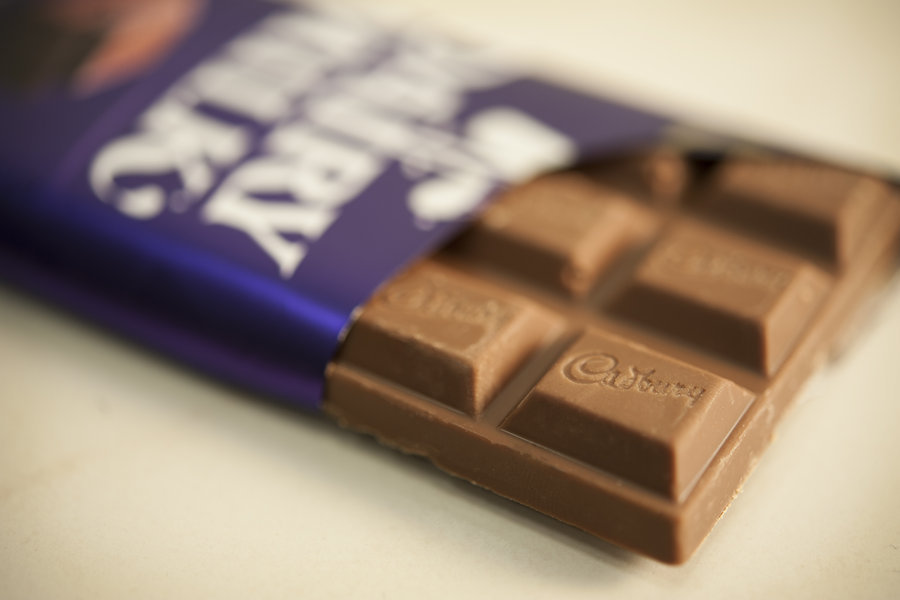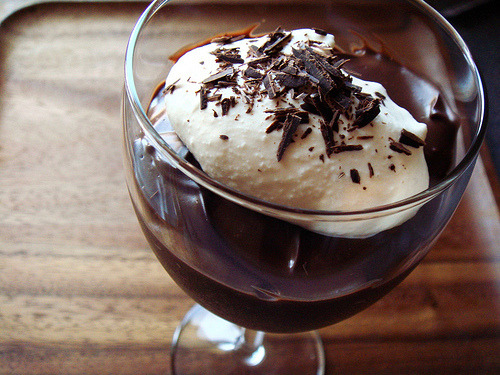High in Calories
Limit the amount of chocolate you consume to avoid going over your daily calorie allotment and gaining weight. Dark chocolate has 598 calories per 100 grams, which is 3.5 ounces. The same amount of milk chocolate has 535 calories. White chocolate, which isn't a true chocolate since it doesn't contain any cocoa solids, just cocoa butter, contains 539 calories per 100 grams.
High in Fat
Chocolate also contains a lot of fat. A 100-gram serving of dark chocolate has 42.6 grams of fat, including 24.5 grams of saturated fat, which is 66 percent of the daily value for total fat and 122 percent of the DV for saturated fat. Milk chocolate is lower in fat, with 29.7 grams of fat, including 18.5 grams of saturated fat. Even though a high percentage of the fat in milk chocolate consists of a type of saturated fat called stearic acid that doesn't raise your cholesterol levels, this is still a lot of fat. Consuming too much fat or saturated fat increases your risk for obesity, high cholesterol and heart disease.
High in Sugar
Sugar adds calories without providing any essential nutrients. The American Heart Association recommends women limit their added sugar intake to no more than 100 calories, or 25 grams, per day and men consume no more than 150 calories, or 37.5 grams, of added sugars per day. Each 100-gram serving of dark chocolate contains 24 grams of sugar, and the same amount of milk chocolate has 51.5 grams of added sugar.
Consumption Considerations
Chocolate eaten in moderation might not increase your risk for weight gain, since it contains flavonols, a type of beneficial plant chemical that acts as an antioxidant, that may decrease absorption of fat and increase satiety, notes an article published in "Phytotherapy Research" in 2013. You may need to eat up to 3 ounces per day of dark chocolate that contains at least 65 percent cocoa to experience heart-health benefits, so you'll have to eat less of other high-calorie foods to compensate for the 450 or so calories the chocolate contains, notes MayoClinic.com. Dark chocolate contains more than twice as many beneficial flavonols as milk chocolate, according to a study published in the "Journal of Agricultural and Food Chemistry" in August 2011.
Source
http://livehealthy.chron.com/bad-points-chocolate-6712.html
References (9)
- HealthAliciousNess.com: Nutrition Facts Comparison Tool
- MayoClinic.com: Healthy Chocolate: Dream or Reality?
- American Journal of Clinical Nutrition: Chocolate Feeding Studies: A Novel Approach for Evaluating the Plasma Lipid Effects of Stearic Acid
- American Heart Association: Sugars 101
- University of Illinois Extension: Eating for Cadiovascular Health
- Phytotherapy Research: Dark Chocolate: An Obesity Paradox or a Culprit for Weight Gain?
- Food & Function: Differential Effect of Polyphenol-Rich Dark Chocolate on Biomarkers of Glucose Metabolism and Cardiovascular Risk Factors in Healthy, Overweight and Obese Subjects: A Randomized Clinical Trial
- AARP: Harvard Study: Dark Chocolate Can Help Lower Your Blood Pressure
- Journal of Agricultural and Food Chemistry: Flavanols and Methylxanthines in Commercially Available Dark Chocolate: A Study of the Correlation with Nonfat Cocoa Solids




very interesting keep posting.
ReplyDeletehealthguidereviews